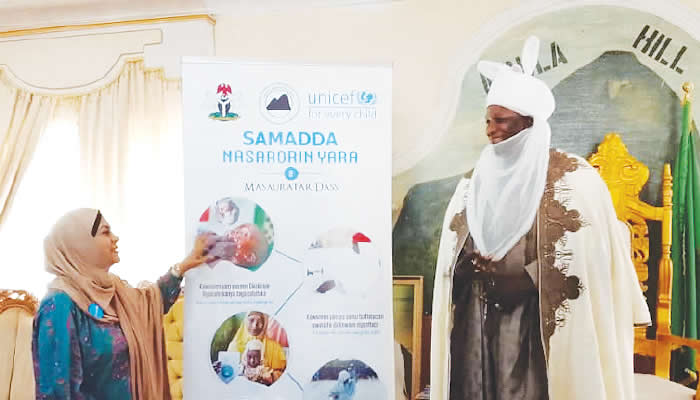The United Nations Children’s Fund (UNICEF) has achieved a significant milestone in its fight against polio and other preventable childhood diseases in Bauchi State, Nigeria, by securing the crucial support of traditional rulers. Recognizing the influential role of traditional leaders within their communities, UNICEF has strategically engaged them in the campaign to promote polio vaccine uptake and ensure maximum compliance among the populace. This collaboration marks a crucial step towards achieving the shared goal of eradicating polio and improving child health outcomes in the region.
UNICEF’s Bauchi Field Office Chief, Nuzhat Rafique, during a visit to the Emir of Dass, Usman Bilyaminu, emphasized the importance of traditional institutions in driving positive change. She commended the Emir for his unwavering commitment to children’s well-being and urged him to mobilize other traditional and community leaders across the state to ensure that every child receives the necessary immunizations. The Emir of Dass also serves as the Chairman of the Bauchi State Emirate Councils Committee on Health (BASECCOH), demonstrating the deep integration of health concerns within the traditional leadership structure.
Rafique highlighted the exemplary progress made in Dass Local Government Area, which has achieved zero-dose status, meaning no child has missed their scheduled vaccinations, and has also become open defecation free. She contrasted this with the overall situation in Bauchi State, which unfortunately lags behind in key health indicators. With an upcoming polio campaign slated for the end of the month, considered Nigeria’s last chance to eradicate the disease, Rafique stressed the urgency of reaching every child, especially those in marginalized communities. She pledged UNICEF’s support and collaboration with the traditional leaders in reaching even the most resistant households.
The Emir of Dass affirmed the commitment of the traditional institution to the polio eradication efforts, outlining a renewed strategy that includes regular visits to health facilities by traditional rulers to monitor the progress of immunization activities. He further explained that each District Head is now tasked with routinely visiting health facilities within their jurisdiction, reinforcing accountability and local ownership of the campaign. This proactive approach demonstrates a strong commitment to driving progress on the ground and ensuring that the message of the importance of vaccination reaches every corner of the Emirate.
The collaborative approach between UNICEF and the traditional authorities in Bauchi State holds great promise in overcoming resistance to vaccination and achieving comprehensive coverage. By leveraging the respect and influence of traditional leaders within their communities, the campaign can effectively address concerns, dispel misinformation, and ultimately encourage increased acceptance of polio vaccines and other essential childhood immunizations. This partnership is not just about delivering vaccines; it is about building trust and fostering a culture of health within the community.
The commitment demonstrated by both UNICEF and the traditional leaders underscores the shared understanding of the critical need to protect children from preventable diseases. The success of the polio eradication campaign hinges on the collective efforts of all stakeholders, and this partnership serves as a model for community-driven health initiatives. By combining the technical expertise of UNICEF with the deep-rooted community connections of traditional rulers, Bauchi State moves closer to achieving a future free from the debilitating effects of polio and other childhood diseases. The shared goal is a healthier and more prosperous future for the children of Bauchi State.














